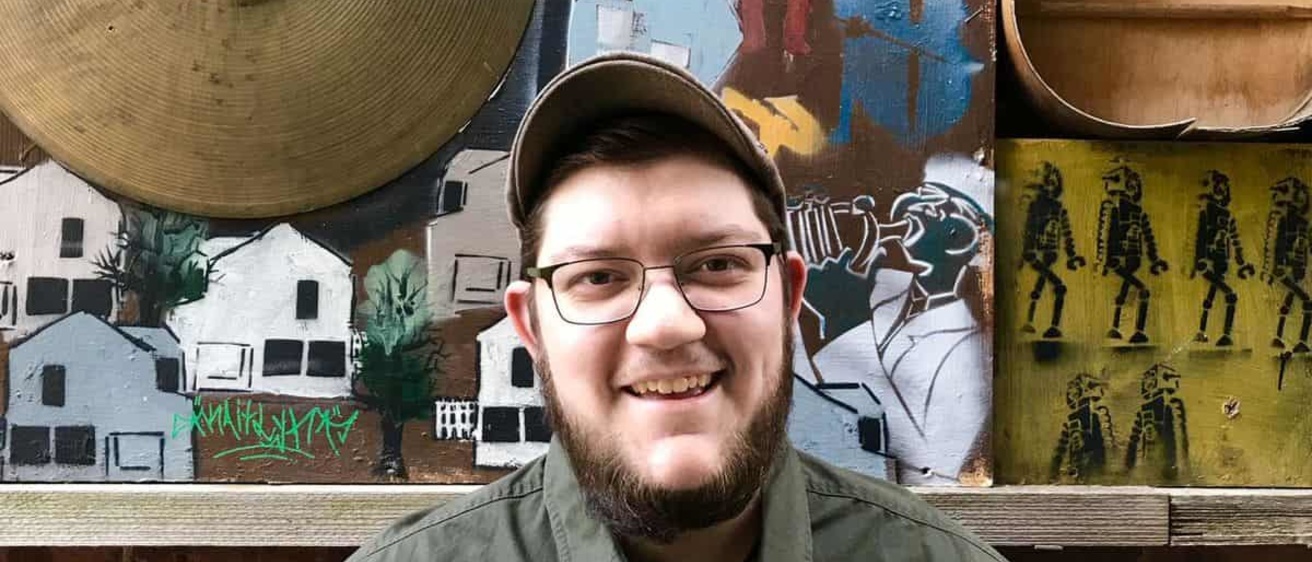Aiden Bettine, the first Humanities for the Public Good (HPG) Graduate Fellow, is already embodying the goals of this grant. A historian with a strong commitment to public scholarship, Aiden is pushing the boundaries of his discipline in experimental and collaborative directions. With funding and support from The Andrew W. Mellon Foundation, the Office of the Vice President for Research, and the UI Graduate College, Bettine has clearly made the graduate research fellow an important support player and advisor to the HPG project.
"As part of exploring experiential approaches to preparing humanities PHD students for diverse careers, we're exploring what it means to 'learn by doing' and to 'learn side by side,'" explains Obermann Director Teresa Mangum, who is the P.I. for the grant. "Aiden has been a wonderful partner—helping us to capture what we're learning on the HPG website, connecting us with other graduate students, sharing his experiences, and offering thoughtful feedback."
Defending and Protecting
Aiden's work with HPG has hardly been the only thing on his plate this spring. In March, the Milwaukee native, who is concurrently pursuing a PHD in History and an MLS in Library and Information Science, successfully completed his comprehensive exams and held his dissertation prospectus meeting.
His dissertation, “To Protect Our Own History: Community Archiving and the City of Chicago, 1970–2018," focuses on archives created by marginalized communities and on their efforts to preserve their own pasts. Aiden hopes to capture the intersectional history of Chicago by researching and sharing the efforts of the American Indian Center Archive, the Bronzeville/Black Chicagoan Historical Society, the Gerber/Hart Library and Archives (which serves Chicago's LGBTQ community), the Japanese American Service Committee Legacy Center, and the Shorefront Legacy Center (dedicated to Black history of Chicago's Northshore).
Statewide Archive Project
Simultaneously, Aiden is building an independent archive, the Transgender Oral History Project of Iowa (TOPI). The purpose is to recognize, collect, preserve, and celebrate the lives and stories of transgender and gender non-conforming people across the state of Iowa, while simultaneously building a digital archive of transgender history. The project has received broad campus support. Aiden tested out the idea during the January 2018 Obermann Graduate Institute and developed the digital archives platform with the help of a summer 2018 Graduate College Fellowship with the UI Libraries Digital Scholarship & Publishing Studio. He is now creating 25 oral history kits for distribution to statewide community partners thanks to a Community Impact Grant from the UI Office of Outreach and Engagement so that those communities can document their stories. He hopes that the web site and first interviews will be available next fall.
Aiden believes that many faculty view projects like TOPI as distractions from coursework and dissertation production. At best, they are tangential to a student's "real" work. At worst, they are likely to get a person off track. But Aiden doesn't see his various projects this way at all. That's why he's excited by the possibility that HPG can help to create a cultural shift in higher education so that projects like TOPI are viewed not only as “an asset to the job market but also as creating happier, healthier, and more thoughtful graduate students.” Aiden adds that he hopes the University of Iowa and other universities of the future will focus on “wholistic and innovative graduate education.”
No Slowing Down
Aiden himself has not been slowed down as a result of his public engagement work. This spring, in addition to being a major organizer of the HPG's first symposium, "National Experiments in Career Diversity," he was recognized as an Outstanding Teaching Assistant, an award that clearly delights him. He also presented at five conferences, including the inaugural Queer History Conference at San Francisco State University and the Midwestern Archives Conference in Detroit. This summer, Bettine will travel to North Carolina as one of four graduate students selected to represent the UI at the National Humanities Center’s 10-day Graduate Student Residency, which will delve into pedagogical practices for the undergraduate classroom in a project-based, interdisciplinary, digital format.
Although Aiden will be completing his role with HPG this summer—handing off the reins to fellow Obermann Graduate Institute Fellow and English PHD candidate Victoria Burns—he says he will remain closely involved as a participant. And no, he doesn’t find this distracting at all. With his characteristic good nature, Aiden admits that “while some of my work might be viewed as a distraction by people in my discipline, I’ve held on to the knowledge that it is where I find joy. TOPI and other projects are what rejuvenate me and give me fuel to do the traditional work.”
